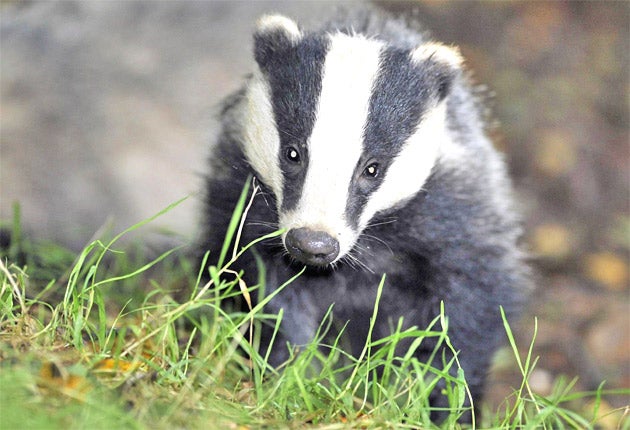Plans for badger cull pit farmers against animal rights activists
Farmers will be able to form syndicates to cull badgers over large areas. Some 70 per cent will be culled by trained marksmen with powerful rifles

Battle lines for a countryside conflict were drawn up yesterday after the Government said it would permit a cull of badgers in a bid to limit the spread of TB in cattle.
Opposition politicians, animal welfare organisations and wildlife groups queued up to criticise the plans, announced by the Environment Secretary, Caroline Spelman, as inhumane, unscientific and unnecessary, while farmers, landowners and vets welcomed them as essential in the fight against the disease.
The split foreshadows an almost certain legal challenge to the proposals, likely to come into effect next year, and the possibility of violent disorder if attempts are made by animal rights activists and others to prevent a cull.
Subject to successful trials next summer, groups of farmers will be licensed to organise the widespread shooting of badgers across England, Mrs Spelman told the Commons. She said it was clear that badgers were contributing to the spread of TB among cattle and current measures were not checking it.
"This terrible disease saw 25,000 cattle slaughtered last year, has cost taxpayers £500m over the last 10 years in England alone, and if not checked, will cost a billion pounds over the next decade," she said, commenting that she was "persuaded of the case for culling".
Under the plans, farmers will be allowed to come together in syndicates to organise culls, at their own expense, over substantial areas of at least 150 squares kilometres, and lasting at least four years. The aim will be to cull at least 70 per cent of the badgers in a given area; the killing will be done by specially trained marksmen with high-powered rifles.
After further discussions on the licensing arrangements over the next few weeks, two pilot schemes next summer will test that the shooting method is effective, humane and safe for the public, and if it is given the go-ahead by an independent panel, widespread culling could begin next year or possibly in 2013.
Mary Creagh, Shadow Environment Secretary, said that the cull was "the wrong way to tackle bovine TB". She said: "This decision is driven by political expediency rather than sound science. Free shooting of badgers has never been tested and could prove inhumane. The cull will cost farmers more than it saves them, and could spread bovine TB in the short term as badgers move out of cull areas."
Caroline Lucas, leader of the Green Party, spoke of "a barbaric slaughter of badgers". The RSPCA said the decision marked "a black day", and the League Against Cruel Sports said that "all the evidence shows that culls do not work".
The Humane Society International said it was "appalled" by the decision. "The slaughter of badgers as a means of controlling the spread of tuberculosis in cattle has been overwhelmingly declared ineffective by a host of eminent scientific experts," said director Mark Jones. "We do not need further government consultations, pilot studies or trials to tell us that slaughtering badgers won't help."
Peter Kendall, president of the National Farmers' Union, said: "I join with farmers up and down the country today in breathing an enormous sigh of relief that the Government has shown leadership in tackling this terrible disease. This has never been about eradicating badgers; this is about eradicating disease. Today is a massive step forward."
Join our commenting forum
Join thought-provoking conversations, follow other Independent readers and see their replies
0Comments